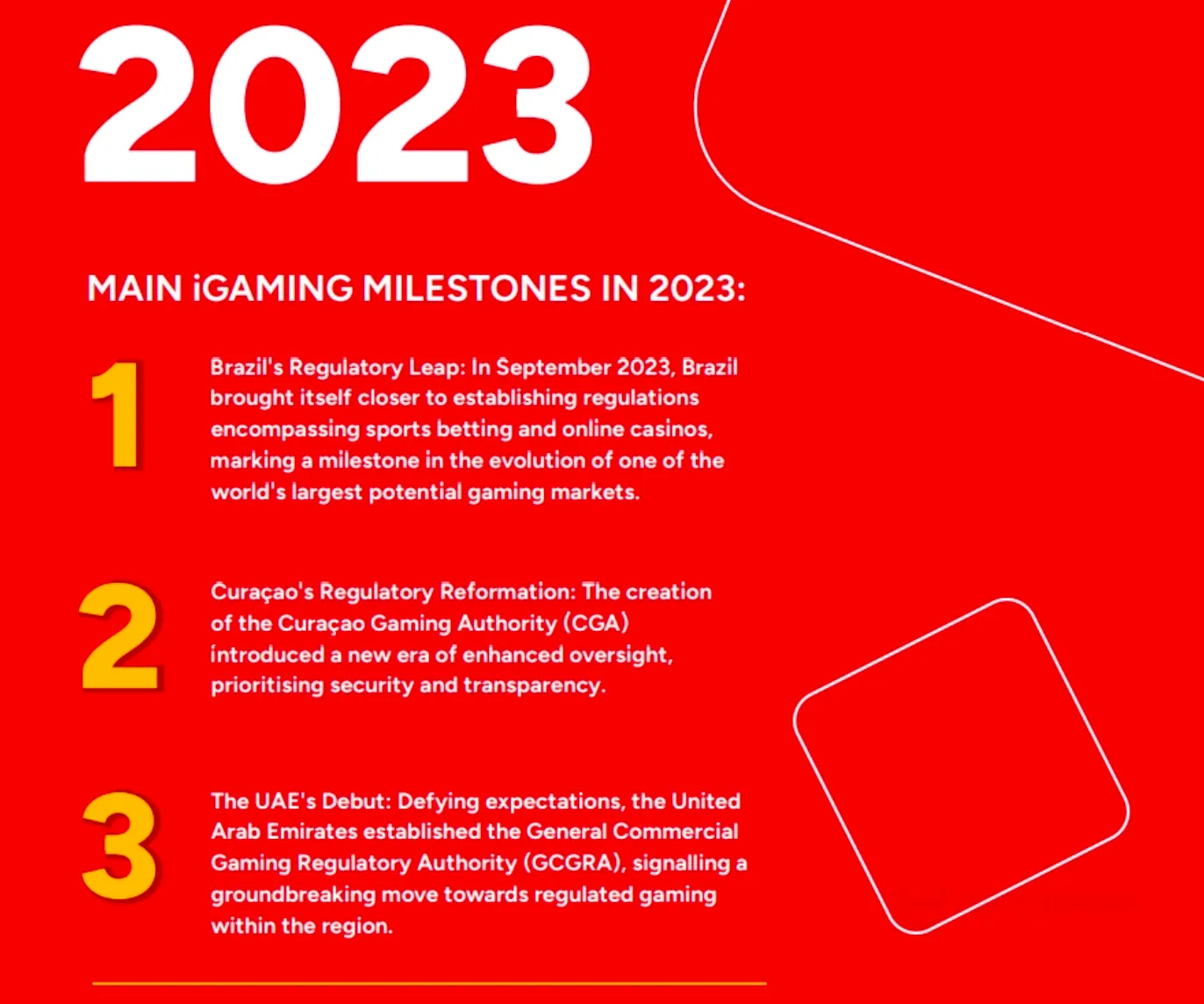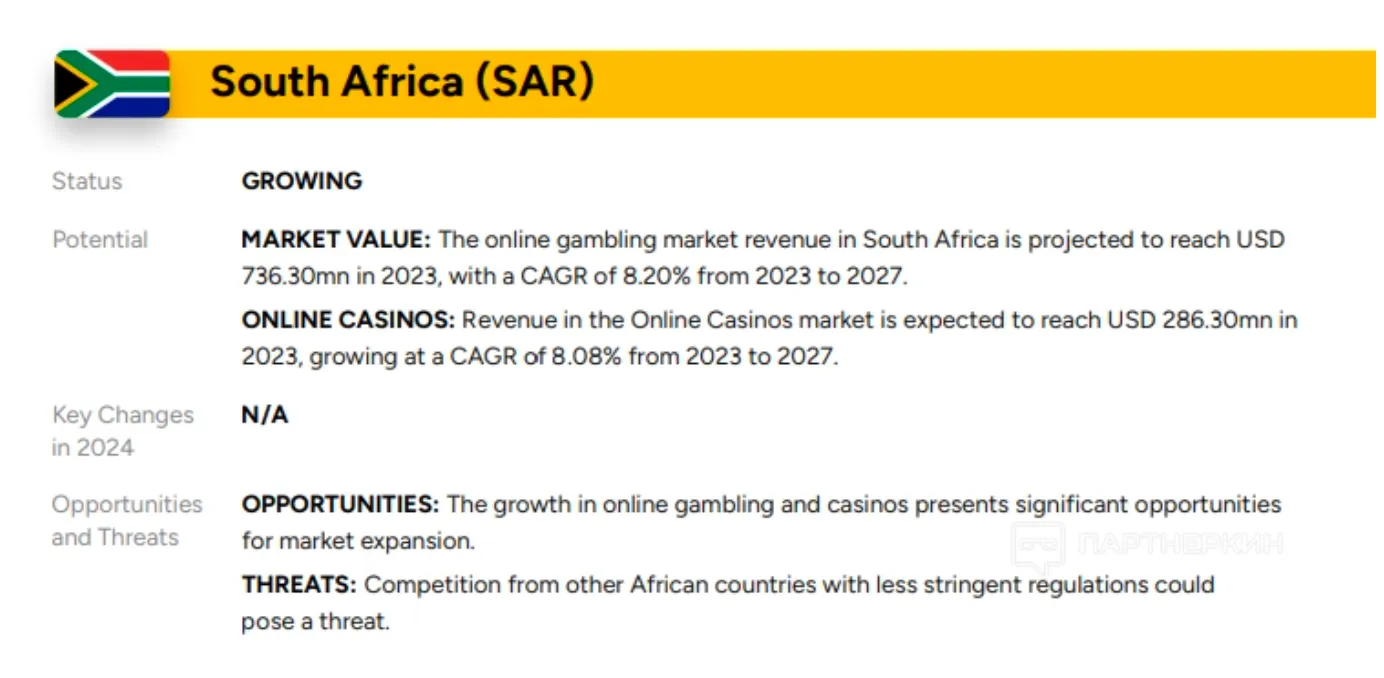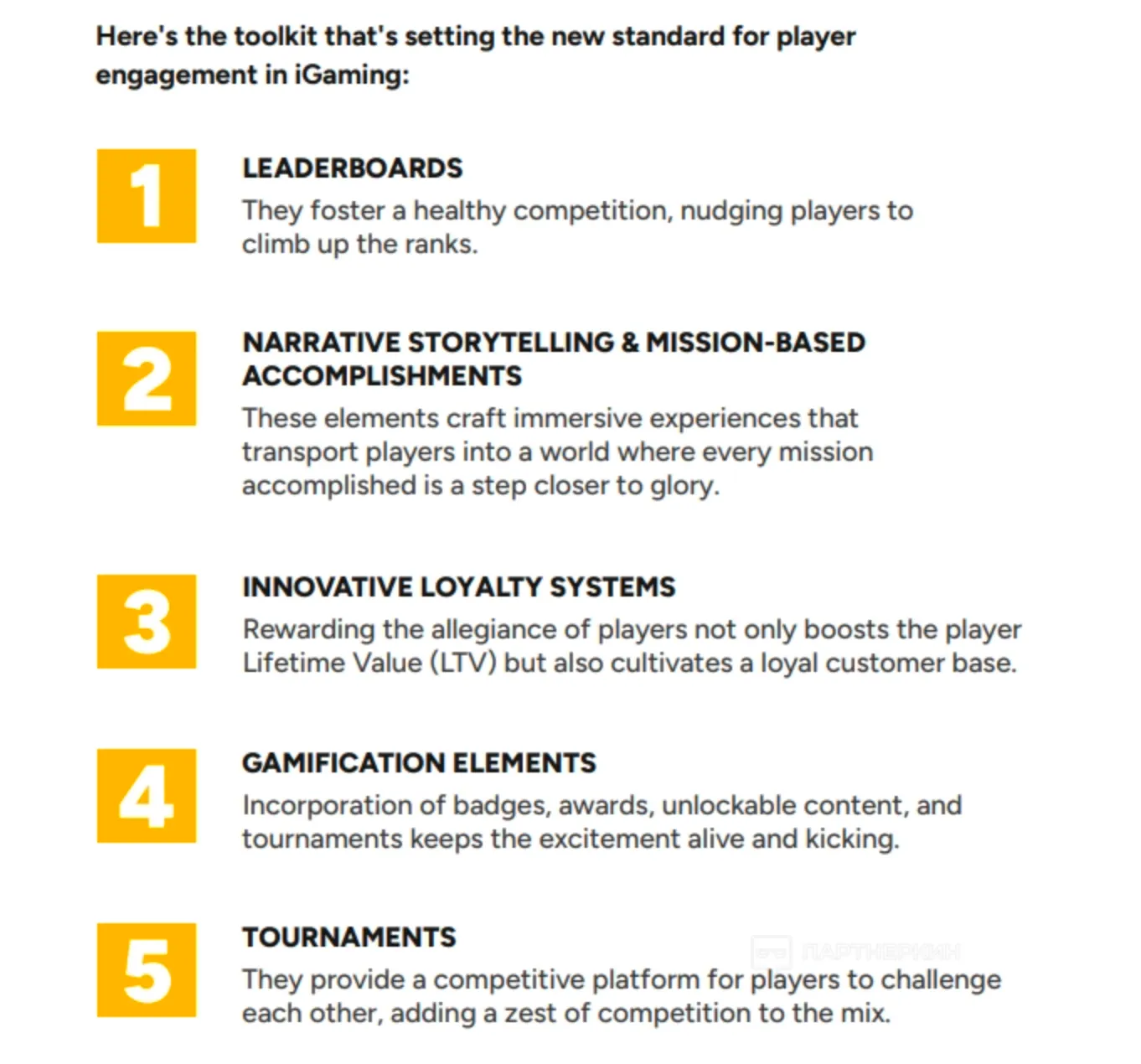

by Editor
In 2023, the gambling industry faced severe legislative restrictions. Not only were gambling activities under close legal scrutiny, but iGaming resources were also subjected to cyberattacks. Despite this, the industry expanded and evolved — the annual report with prospects for 2024 is evidence of that.
General trends in iGaming
The first thing to pay attention to is the trends of 2023 that will only strengthen in 2024. The table below highlights promising directions for investments in iGaming:
- Data-driven decision-making. Thanks to technology, there is now the ability to process large volumes of data.
- Mobile games dominate over offline casinos. From January to October 2023, 70% of all gaming sessions took place on users' mobile phones. Various payment methods. According to Optimove, 58% prefer reliable payment methods to increase loyalty.
- Trend towards the legalization of the niche. New legislative acts have emerged to regulate the iGaming market. 95% of bets are placed on legal websites. And the new laws of Brazil and the UAE reflect the global interest in supervising the gambling business.
- Responsible approach to gambling. Malta's laws now require gambling companies to track signs of gambling addiction and promote "safe gaming", meaning playing in moderation.
- Enhanced data protection. Gartner predicts that by 2024, 75% of the world's population will comply with privacy regulations, and the industry is moving towards a future without the use of cookies to enhance data security.
- Fight against fraud through anti-fraud technology and the implementation of artificial intelligence.

The target audience and sphere of influence of the gaming industry have also expanded. Not everyone can afford to visit offline casinos. Not everyone places bets in bookmakers. But mobile gambling games are a temptation accessible to gamblers. Currently, 70% of gaming sessions are from mobile phones.
And here are the trends set by 2023:
- The Brazilian market has established laws to regulate sports betting and online casinos.
- The Curacao Gaming Control Board has tightened supervision rules over the iGaming industry. The highest priority is given to the policy of transparent conditions, as well as the security of users and their data.
- The UAE also debuted in the gambling business by establishing the General Commercial Gambling Regulation Authority (GCRA). This means that, like Brazil, the Emirates will develop the market towards the legalization of casinos and betting.

Now let's take a closer look at the directions of development.
Legalization and transition from global to private
There are three laws regulating the sphere of casinos and betting:
- Maltese laws.
- Separately, bill № 55, which empowers Maltese courts to create a protective legal environment for the gambling industry.
- Curacao reforms - simplify the legalization of the iGaming vertical and establish common standards.
There are also two trends — a focus on anti-money laundering (AML) protocols to maintain fairness and prevent financial crimes. And the International Gambling Resolution (LOOK) to create a safe gaming environment.
Several countries, including Germany, Sweden, and the Netherlands, advocate for the right to independent legal regulation.

Plus: Monopolization will disappear. And in free market conditions, countries will start competing to offer investors more favorable conditions for the gambling business.
Minus: Not everyone is ready to support the gambling business. Societies with conservative views on life and the concept of sin, religious communities, are likely to declare casinos illegal or tighten rules within their regions.
The trend towards localization will also affect geo-targeting settings: geo-dependent advertising will have to comply with local laws. Such changes have not gone unnoticed, and major gaming companies, such as Entain, are rethinking their strategies to align with national certifications.
Promising regions for the gaming industry
Brazil and Peru have strengthened their positions in the Latin American market. In the screenshot below, we see the key points — from the current status and potential of the Latin American countries' market to the direction of technology development and potential threats:


The market in Peru and Brazil is just beginning to develop. One of the main risks there is the prospect of intense competition due to attractiveness for investors.
While not everyone in Peru has mobile phones, the U.S. is taking a big step towards applications. Online casinos, mobile casinos — it's all about the American dream. Studies show that some respondents view casinos as a source of income. This raises concerns about gambling addiction and potential countermeasures:

In Ontario, the gambling and betting market is trying to adapt to users. However, the legislative framework in this region aims to restrict development:

The main obstacle to the development of the gambling industry in the UAE market is the conservative culture of the residents:

Nevertheless, the gambling business is developing as a resort industry and attracts wealthy tourists.
The UK market is stable: the gambling business is legalized there and relatively safe. But what is truly interesting is the statistics from Finland. According to it, 80% of the population is somehow involved in gambling. That is, almost the entire population, except for children and insolvent citizens:

The Swedish market is also stable. The government believes that the legalization of gambling in 2019 was successful. By July 1, 2024, they plan to increase taxes from 18% to 22%:

Nigerian countries are still on the path of developing online gambling. Their market is promising but not stable, partly due to the lack of centralized legal regulation of the gambling industry:

Special attention should be paid to the development of online gambling, but it's important to be mindful of the competition from neighboring countries:

In 2024, the Indian market will be remembered by gamblers and betters for increased tax rates —up to 28% or even higher. High official taxes force users to switch to unofficial platforms. As a result, cybersecurity threats emerge:

Latin America has an advantage as the region with the most promising prospects for gambling in 2024, followed by North America and Europe. The Asia-Pacific region is also promising. However, the markets of Africa and the Middle East, although prospective, will take a smaller share of the market in the near future.
The Chief Commercial Officer of SOFTSWISS is betting on Brazil as the new center for the development of the iGaming industry:
"The entry of Brazil into the regulated gambling business in 2023 is important for the entire industry. In terms of population, Brazil surpasses any European country or U.S. state. And now they are fighting for the right to independently control the gambling industry. This signals a transition to organized and reliable markets worldwide". — Max Trafimovich, Chief Commercial Officer at SOFTSWISS
Revenue of the gambling industry in figures
In the European iGaming market, revenue from the gambling industry increased by 23%, reaching €108.5 billion or $115.7 billion in Gross Gaming Revenue (GGR) in 2022. These figures demonstrate the industry's stability and growth potential. Only the online segment surged by 8% compared to the previous year.
Using the example of Brazil: new laws helped create 200 legal jobs — workers were needed to monitor the legality of sports betting. Legalizing casinos and bookmakers ensures a stable influx of money into the treasury. This is particularly noticeable for third-world countries: in Colombia, taxes from legal casinos have contributed to the development of healthcare and public services.
Integration of AI
The gaming industry quickly recognized the potential of AI, leading to the implementation of neural networks in marketing, design, analytics, and individual user gaming experiences.
At the top is the use of AI for machine learning: 73.9%. The share of AI in the blockchain and cryptocurrency sector is 13%. The use of neural networks to eliminate the need for cookies and enhance Big Data technologies accounts for 8.7%. Other industries, such as design and advertising in the iGaming vertical, utilize AI at a rate of 4.4%.

It’s particularly noteworthy to highlight the initial gambling games and designs for applications and websites created by AI, as well as data from beta tests that AI collects faster than humans:

80% of the design work in creating casino applications is done with the help of Midjoyrney.
In addition, chatbots, virtual assistants, and round-the-clock customer support services are being implemented. They are also based on artificial intelligence.

AI functions for fighting fraud and enhancing cybersecurity play into the hands of the gaming industry as a whole. Legal bookmakers and gambling houses will be able to protect user accounts and even use biometrics for secure authorization.

If we talk about gambling without ignoring its benefits, there are two points here:
- In the future, AI will help identify and block scammers.
- Artificial intelligence will also take care of gambling addicts. While it's challenging to envision exactly how this technology will work, neural networks will gather data about gamblers, potentially allowing for early intervention.

Rejection of Cookie
The rejection of cookie technology has been discussed not for the first time. So far, the abandonment of this type of data collection has been postponed to 2024. But this time, SOFTSWISS is almost certain that cookies will disappear. Therefore, in the report, they have prepared several recommendations.

Life’s a game…
In addition, we observe a trend towards gamification. It's everywhere, even in betting, there are game characters, leaderboards, narrative elements. Here are a few examples of gamified content:
- Storytelling and mascots in applications;
- Loyalty system rewards. For example, for daily app visits, rewards for donations, tournament rewards, access to blocked content.

Esports is also gaining momentum and expanding its target audience: from $474 million in 2021 to an estimated $577 million by 2024. As a result, profit from bets in the esports industry will increase. According to forecasts, the esports market could reach $3.2 billion by 2027.
Responsible Gambling (RG) — the concept of responsible gambling
Contrary to the prevailing opinion, compulsive gamblers aren’t beneficial for casinos. This will become especially noticeable in the near future, thanks to the strengthening trend of casino legalization.
44% of respondents support measures for responsible gambling. The rest either have a neutral attitude towards the initiative or believe that gambling addiction and the players susceptible to it don’t impact the gaming industry. In reality, the development of such initiatives for mental health in gambling is influenced by several factors. The top positions are occupied by the media and public opinion:

A significant factor in tracking addictions has also become the Maltese amendments.
Marketing strategy for 2024
The promotion of the gambling industry is happening through the realms of influencer marketing. Opinion leaders, bloggers, will play a crucial role. Moreover, the emphasis will be on native advertising, vertical videos, and organized events on the topic of iGaming.
The next stage of promoting the gaming industry is affiliate marketing. It pursues several goals, including:
- Continuous attraction of new players;
- Expansion of the industry's influence;
- Enhancement of brand recognition.

Conclusion
The gaming industry took a step towards legalization. Whitening of the business has led to unexpected consequences: now online casinos are not only chasing profits but also participating in social spheres such as charity, environmental advocacy, and care for the mental health of players.
New promising markets have opened up for development. One of the largest is Brazil, and the United Arab Emirates is considered promising for gaming tourism. Overall, the online world and the general gamification of content have won. 80% of gaming interactions occur through applications and mobile devices. However, the romance of offline casinos persists, with the trend towards social interaction with real players, and it shows no signs of disappearing.
Also, in the near future, a doubling of casino profits can be expected, thanks in part to legalization. The pinnacle of technological advancements in gambling establishments will be artificial intelligence: its capabilities will be fully utilized in creating advertising videos and visuals, as well as in data analytics and cybersecurity.

by Editor



comments ....(0)
Leave a comment
You must be in to leave a comment